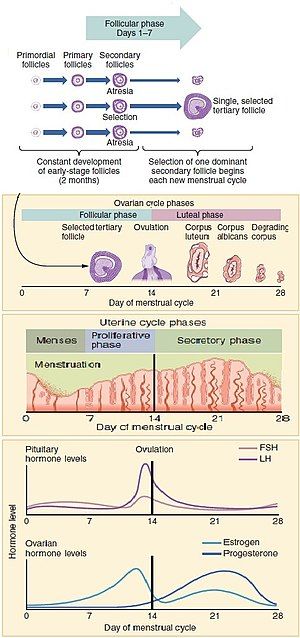Breaking The Period Taboo
Apr 26, 2019 • 12 views
When a natural part of a reproductive cycle is labeled as a taboo and is perceived as unclean and impure, it is time that we check the quality of our schooling. Menstruation also known as a period is the regular discharge of blood and tissues from the inner linings of the uterus from the vagina. It is a monthly phenomenon which is unique to women. Girls start menstruating usually after they hit puberty at the age of 12 or 13.

A depiction of menstrual cycle
Menstruation has for long been associated with stigmas and taboos. The onset of menstruation is often believed to bring inauspicious and a woman on her period is considered as impure. Religious myths and age-old superstitious have created an environment of ignorance. Different religions have different menstruation related rules, but the one thing that they all share in common is the restrictions they impose through their prescribed rules. Islam forbids sexual contact with women during menstruation. In Hinduism women are made to follow certain rules during their period. They are barred from entering temples and even prohibited from entering the kitchen. They are supposed to follow a different food diet and refrain from all sacred activities. Even the Western Civilization does not hold a good track record when it comes to period related taboos. But the unethical treatment of women in the name of holiness doesn't stop here. Some self-proclaimed scholars and intellectuals take it upon themselves to decide a certain code of conduct that every woman should follow when on their period. It is quite baffling that women have always been taught or told by others about what and what not to do during a change that takes place inside their body.
Luckily today we are in a position to challenge the retarded belief system that people have clung onto for a long time. Creating awareness has helped a great deal in busting myths about menstruation. But the challenge that we face today is bilateral. While we're still struggling with the repressive and conservative nature of the patriarchal society, the issues of menstrual hygenie have raised the alarm for us. According to a recently conducted survey, majority of rural women in our country don't use sanitary pads, and instead use cloth. Using cloth during menstruation is unhygienic and has an adverse effect on our health.
On the positive side ,the number of awareness campaigns urging women to switch to sanitary pads, or tampons or even menstrual cups during period has increased significantly. But the motive is no more limited to organizations fighting to eradicate the stigmas or taboos surrounding menstruation, it has reached the big screen too. When it comes to movies with a social message ,the Akshay Kumar starrer Padman would always top the list. No one would have thought that a taboo subject as menstruation would be openly highlighted in a movie. The critical acclaim and the love that the movie received from the audience is testimony to the fact that we are ready to break the sociocultural norms and get rid of any illogical custom. Not only this the famous documentary, Period: End of Sentence on Netflix , which tells the story of a woman and her courage ,who broke all taboos and made sanitary pads accessable to rural women, won all hearts and even won the prestigious Oscar award. The recent developments are being seen as positive steps towards making society that is progressive and where there is no room for stigmas and taboos.
